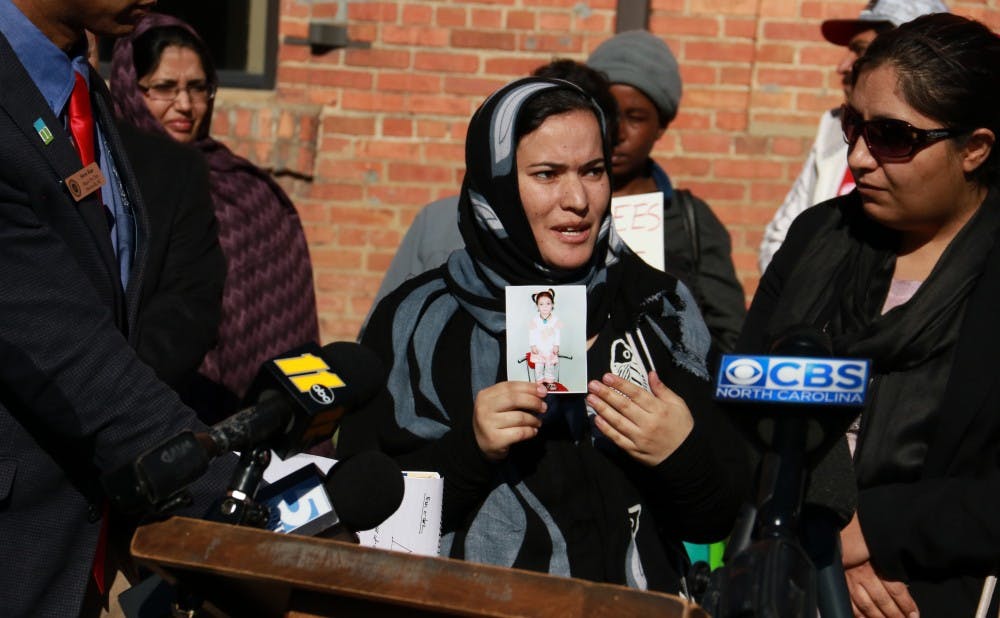All Updates:
In response to a federal judge's ruling Friday that halted the immigration ban nationwide, Michael Schoenfeld, vice president for public affairs and government relations, said administrators were reviewing the matter with immigration attorneys. He characterized the situation as "very confusing." Updated Saturday, Feb. 4 at 12:47 p.m.
President Richard Brodhead and 47 other U.S. university leaders signed a letter Thursday urging Trump to rectify or rescind the executive order.
"This action unfairly targets seven predominantly Muslim countries in a manner inconsistent with America’s best principles and greatest traditions," the letter reads. "We welcome outstanding Muslim students and scholars from the United States and abroad, including the many who come from the seven affected countries." Updated Thursday, Feb. 2 at 6:40 p.m.
Original brief:
Duke community members have articulated a variety of responses to President Donald Trump’s executive order, which barred immigrants from seven Muslim-majority nations.
The University has several dozen students from countries covered by the order, confirmed Michael Schoenfeld, vice president for public affairs and government relations. However, he added that none of them "were affected at this time." President Richard Brodhead emailed the community Sunday promising administration would not share student records with immigration officials—a stance that had already been official policy and is consistent with federal student privacy legislation.
Since then, several different units of the University have sent additional messages.
“We realize that lives of members of our community can be deeply affected by these matters, that diversity and inclusion are central to our community, and that core values of the school and University come into play in important ways,” wrote Kelly Brownell, dean of the Sanford School of Public Policy, in an email to the school Monday morning.
Brownell wrote that Sanford faculty will be meeting Monday to discuss what response they could take to the order. He noted that he has joined a letter from faculty members across the country opposing the ban, but added that it was up to other faculty members if they wanted to join as well.
As of Monday evening, more than 80 Duke community members have added their names to the letter. The list includes Larry Moneta, vice president for student affairs, and Robert Lefkowitz, James B. Duke professor of medicine and a 2012 Nobel Laureate.
Dr. Michael Merson, director of the Duke Global Health Institute, and Wolfgang Joklik professor of global health, wrote in an email to the DGHI community that faculty would be meeting in the coming days to discuss the issue. Like Brownell, he also let faculty know about the open letter.
Earlier in the day, Rep. David Price, who is also a member of the Sanford faculty, met with local refugees affected by the Trump's order at Smith Warehouse, where he later held a press conference.
Some in the University have been busy trying to help colleagues respond to the executive order.
David Morgan, chair of the religious studies department, received an email Saturday from Mohsen Kadivar, a religious studies professor and Iranian dissident currently in Germany on a fellowship. Morgan contacted several administrators, including Provost Sally Kornbuth and Vice President for Administration Kyle Cavanaugh, to figure out Kadivar's next steps.
Morgan said Duke consulted with the law firm Ogletree Deakins, eventually advising Kadivar to remain in Germany as scheduled until July. The University also recommended that Kadivar’s wife not join him as had been originally planned, Morgan said.
For his part, Morgan took a hard stance against Trump’s action.
“I think the University needs to stand up as it’s doing,” Morgan said. “It affects us all. Our students, our research, our colleagues. It’s a real direct assault on academic freedom and the place of the university in our society.”
Get The Chronicle straight to your inbox
Sign up for our weekly newsletter. Cancel at any time.
Adam Beyer is a senior public policy major and is The Chronicle's Digital Strategy Team director.

